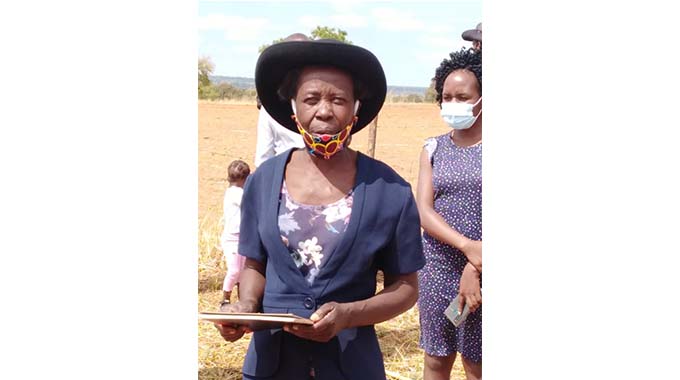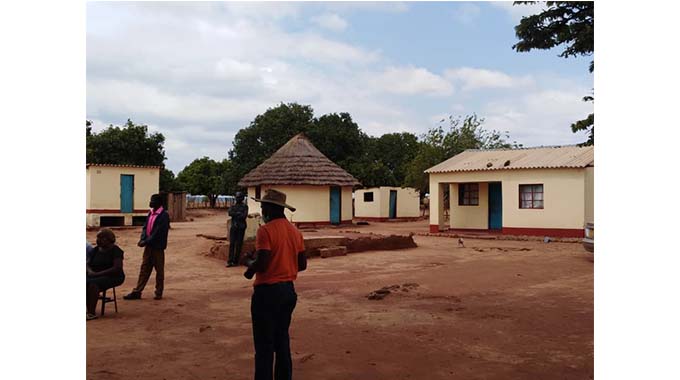Farmer beats drought with Intwasa

Patrick Chitumba, Midlands Bureau Chief
SUBSISTENCE farmer Mrs Elifa Mpofu (70), of Gokwe South District, has since 2010 kept a secret that has seen her managing to feed her family, pay fees for her children and maintain respectable status in her community.
She has a beautiful homestead which she maintains with money from farming.
For Mrs Mpofu, a mother of four children (two are late) and six grandchildren, life changed when in 2010, a non-governmental organisation, Weilthungerhiife (WHH), introduced a Climate-Smart Agriculture (CSA) concept which aims to improve the integration of agriculture development and climate responsiveness.
The concept, she said, meant that she had to abandon ploughing huge tracts of land with an ox-drawn plough for loosening or turning the soil before sowing.
She said she didn’t have the cattle and would borrow from neighbours so that she tilled the land.
However, she said, recurrent droughts and poor forms of agriculture saw her failing to harvest much from the fields forcing her and her family to turn to the Government and NGOs for food aid.
Mrs Mpofu said in 2010, WHH came with the concept called “Diga udye”, “Dig and eat” where she was taught to dig holes in just one-and-a-half acres where she planted maize, millet and any other crops.
“That meant I no longer used a lot of labour or money hiring cattle to till huge tracts of land. I was taught to concentrate on a small piece of land and dedicate to it, and was even able to water the plants even in times of prolonged droughts,” she said.
Mrs Mpofu said in addition to maize and millet, she was planting climate-appropriate vegetables such as sweet potatoes, peanuts and tomatoes.
This, she said, allowed her to harvest almost all year-round and made her family’s diet healthier and more diverse.
“Since 2010, I have managed to plant food for family consumption. We have potatoes, vegetables and we sell some of the produce and I get money for other things such as paying school fees for my children and grandchildren, buying furniture, clothes and buying more livestock. I have been a widow since 2009 and to date I have managed to maintain, develop and keep a big status in the community. This homestead keeps growing and I still maintain it. I don’t beg for food or wait on the Government for food aid. This concept of smart agriculture, for me, pays dividends,” said Mrs Mpofu.
She said the concept – now marketed as Intwasa/Pfumvudza by Government — is a genuine programme that improves yields even under harsh weather conditions.
Mrs Mpofu said subsistence farmers should adopt it as it has proved to be a worthwhile project.
A team from the Food and Nutrition Council under the Office of the President and Cabinet was in Gokwe South District to assess the community’s involvement in food and nutrition security initiatives where they witnessed Mrs
Mpofu’s success story in implementing the Intwasa/ Pfumvudza concept.
The Food and Nutrition Council’s food security initiative entails the involvement of community leaders encouraging communities to embrace the projects with Government and development partners providing financial and technical support in a bid to fight hunger in communities.
She is one of an increasing number of farmers from semi-arid areas who are shifting from growing white maize to hardy, traditional sorghum and millet for food and nutrition security.
Zimbabwe’s erratic rainfall in recent years has posed a huge limiting factor for millions of farming households who depend on maize for food security and their economic well-being.
Since the early 1990s, drought stress has steadily decreased the production and productivity of maize in Zimbabwe, changing the country’s role from a surplus producer of maize to a net food importer, and plunging millions of rural communities into food insecurity and poverty
For a 70-year-old grandmother, Mrs Mpofu said attending to the three plots is easy and saves time for her to attend to other things such as looking after her grandchildren.

Part of Mrs Elifa Mpofu’s homestead
Mrs Mpofu, who was busy attending to builders who are building a new hut at her homestead, said she would never stop practicing smart agriculture which saves time, energy and money.
“I have three plots under this programme you now call Pfumvudza. From 2010 I have been practicing it and I can say
I am a living testimony that this concept being pushed by the Government works. In terms of figures, I realise over three tonnes of maize alone and that is sufficient for my grandchildren year long. Then other commercial crops like sunflower, millet depending on a particular year, I take those to the market,” said Mrs Mpofu.
Mr Abram Nyamazama, Ward 15 Councilor said over 1 000 people in Njelele 2 had been trained under Intwasa/ Pfumvudza and had received their farming inputs.
“Mrs Mpofu has shown us that this concept works and we have over 1 000 people from this ward who have adopted it. I mean they have dug holes and are waiting for the rains and have received their farming inputs,” he said.
Gokwe South District Agriculture Extension Officer Mr Simon Gumindoga said 62 000 farmers had adopted the Intwasa/ Pfumvudza concept.
He said the district has a population of about 300 000 people.
Under the Intwasa/Pfumvudza programme, the Government will provide through the Presidential Inputs Programme, inputs to 1,8 million smallholder farmers.
The farmers were all expected to have done holing out of their plots and mulch collection in preparation for the season by the end of September.
Each household is supported with a standard input package to produce one tonne of cereals and 0,2 tonnes of oil seeds (sunflower or soyabean). Expected total output shall therefore be 1,8 million tonnes of cereals and 360 000 tonnes of oil seed.
The model intends to address household food security as well as the commercialisation of smallholder farming in Zimbabwe.
The inputs will be issued in a package that provides seeds, agricultural lime, basal fertilizer (1x50kg bag), top dressing (1x50kg bag) and Fall Armyworm control pesticides.
It is recommended that a farmer does three plots, two for maize or traditional grains (sorghum, pearl millet or finger millet), one for household consumption, one for income and the third for the establishment of an oil seed crop.
Ms Perpetual Nyadenga, Knowledge Management manager in the Food and Nutrition council, said it is very commendable that people and Government partners bring about people centered programmes that are aimed at bringing about positive change.
Founded in the year 2001, the Food and Nutrition Council is the lead agency under the Office of the President and Cabinet (OPC), tasked by Government with the responsibility of coordination, analysis and promotion of a cohesive national response by multiple sectors and stakeholders to food and nutrition insecurity in Zimbabwe.









Comments